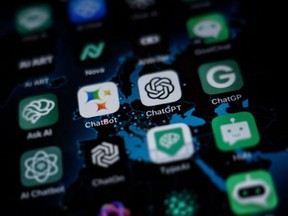Danielle Coffey: Lawsuits can be long and costly, but media has no choice if AI companies take advantage of their intellectual property
Article content
The American economy is built on intellectual property. The United States Patent and Trademark Office estimated that 41 per cent of U.S. gross domestic product comes from IP-intensive industries. From podcasters to influencers to newspapers, intellectual property powers free speech and incentivizes the creative process and investment in quality works.
Advertisement 2
Article content
Article content
Article content
Artificial intelligence companies have recognized this quality but unfortunately have chosen to take advantage of others’ intellectual property to fuel their products. Now the Chinese AI app DeepSeek is teaching those very AI companies how much it costs by using their creativity and intelligence.
The United States has flourished by encouraging experimentation and legally protecting the results, but in the past few decades, as technology has changed, new decisions are needed to fit our law to new technology.
That’s why on Thursday, for the first time ever, a diverse group of news and magazine members of the News/Media Alliance came together to sue an AI company that we believe has been egregiously violating copyright protections as it trains its model and spits out answers for its users.
The plaintiffs include Advance Local Media, Condé Nast, The Atlantic, Forbes Media, The Guardian, Business Insider, the Los Angeles Times, McClatchy Media Co., Newsday, Plain Dealer Publishing Co., Politico, The Republican Co., Toronto Star Newspapers and Vox Media.
Article content
Advertisement 3
Article content
The suit is against Cohere Inc., a rapidly growing AI company that we’re accusing of not even trying to hide the fact that it is lifting content and offering it free — and verbatim — to users.
Cohere has achieved a valuation of more than US$5 billion through massive, systematic copyright and trademark infringement of media content. The Canadian company flaunts the evidence, providing its own receipts. In a feature called “Under the Hood,” as documented in our lawsuit, Cohere shows the sources it copied to deliver its outputs, including full copies of our articles, down to the timestamp of the copying.
Cohere provides users with verbatim regurgitations, fully substitutional summaries and breaking news reports. Thursday’s complaint alleges thousands of examples of infringements.
There’s nothing subtle about Cohere’s many acts of what we believe to be theft. The suit details verbatim lifting of articles, even the posting of a story within an hour of publication. When asked for a particular October 2024 article in the L.A. Times for instance, Cohere delivered the entire article verbatim with only slight wording and punctuation changes.
Advertisement 4
Article content
When asked generally about financial strains on the public transit system in Miami-Dade County, Cohere delivered a complete article from the Miami Herald, with only a minor change to the first sentence. In another prompt, Cohere was asked to provide the text of a Forbes article — and it did, complete with the byline of the Forbes writer.
Lawsuits can be long and costly, but we have no choice. We’ve tried everything over the years — digitally reserving or marking our content as off-limits to bots and scrapers, updating our terms of service, working directly with tech companies, insisting they give back a little of the traffic they have used our content to gain, sometimes even paying them for it.
Nonetheless, the overwhelming benefit has gone to AI companies, and we in the media business have been left with a fraction of the value that our own content has created.
This suit is consistent with the courageous examples of The New York Times, which is suing OpenAI Inc. and Microsoft Corp. over unauthorized use of its articles in generative AI products, and News Corp., which is alleging the same against Perplexity AI, while turning the focus on new actors and unauthorized uses — to enforce our rights and deter other AI companies from stealing content.
Advertisement 5
Article content
This is not an anti-AI lawsuit or an effort to turn back the clock. We love technology. We use it in our businesses. Artificial intelligence will help us better serve our customers, but only if it respects intellectual property. That’s the remedy we’re seeking in court.
Recommended from Editorial
-

Publishers sue Cohere alleging copyright infringement
-

Is AI your new boss? It can replace a CEO in many respects
-

Holding rank as AI hub requires investment in tech and talent
When it suits them, the AI companies assert similar claims to ours. Meta’s lawsuit accused Bright Data of scraping data in violation of its terms of use. And Sam Altman of OpenAI has complained that DeepSeek illegally copied its algorithms.
Good actors, responsible technologies and potential legislation offer some hope for improving the situation. But what is urgently needed is what every market needs: reinforcement of legal protections against theft.
Danielle Coffey is president & CEO of the News/Media Alliance, which represents 2,000 news and magazine media outlets worldwide.
Bookmark our website and support our journalism: Don’t miss the business news you need to know — add financialpost.com to your bookmarks and sign up for our newsletters here.
Article content
As AI companies flaunt their theft, news media has to fight back
2025-02-18 20:18:58








